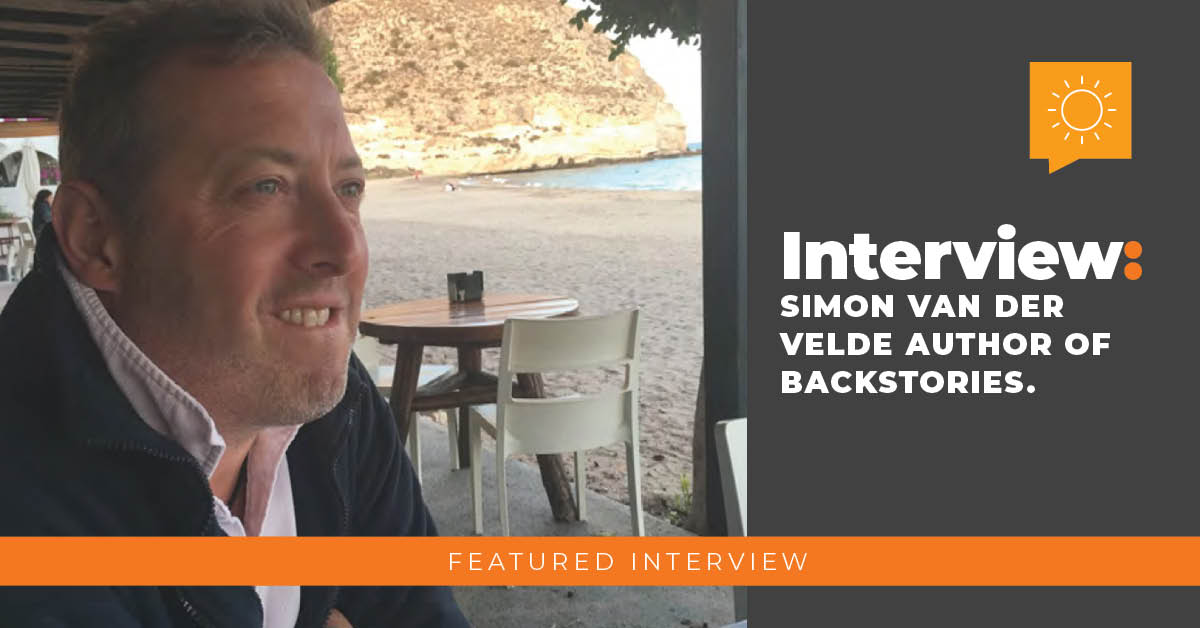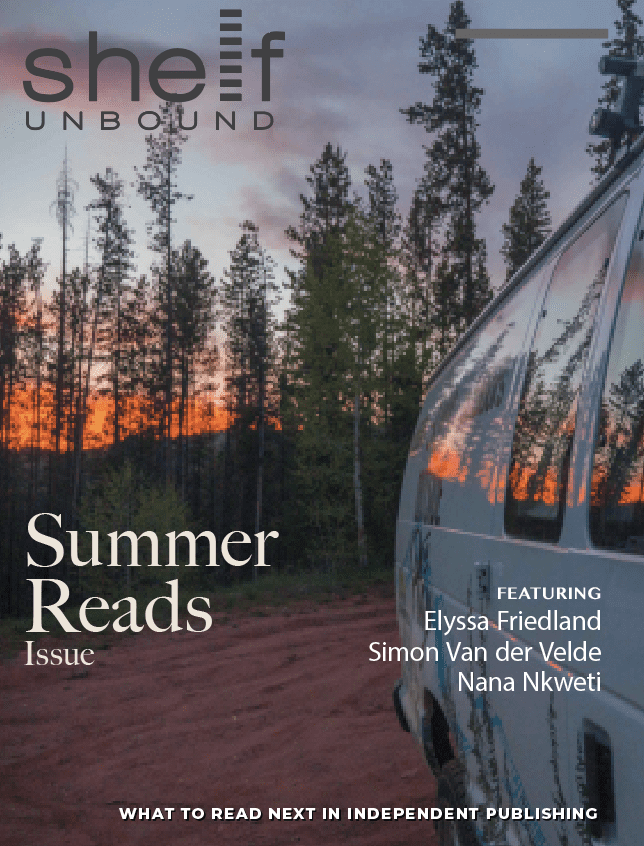By V. Jolene Miller

Simon Van der Velde’s anthology, Backstories, is a unique and intricate summer read. Whether you’re taking your annual beach vacation or settling in for a week in the mountains, if you take Backstories with you, your mind won’t be stationary. Backstories takes readers on a journey to uncover the identities and humanness of each character. I had the opportunity to connect with Simon this summer. Here’s what he has to say about his book, his journey to becoming an author, and what he’s working on next.
According to your website, you’re an advocate — Stop Hate UK, The North East Autism Society, and Friends of the Earth — is that the crux of Backstories?
SV: The crux of Backstories is the emotional truth that compels you to keep reading. The events may straddle fact and fiction, but Backstories is true where it counts, where it hits you, hard in the belly.
As for advocacy, I haven’t done as much as I should, but human diversity is as obvious and natural to me as the sun rising and the Earth turning. Of course, we’re all different. We’re meant to be. What’s the alternative, genetically modified (GM) people? It’s crazy that we even have to discuss it, but of course there is always that primeval, atavistic fear of the ‘other’ that was adaptive in pre-history, and is so harmful today.
I can forgive (to an extent), the old and the ignorant, but what really sickens me is when the educated and privileged use prejudice to play on people’s fears and turn the most vulnerable members of society against each other.
Of course, prejudice is a corrosive evil in society, and that comes through in Backstories. Many of my characters, who turn out to be our heroes, begin life as the very opposite, excluded because they don’t fit in. But, the same is true of the villains. In the end, if Backstories is about diversity, it may not necessarily be in the way you expect. For me, it is a search for the heroes of my childhood, and through them a reaching back to that childhood, and the purity and vulnerability of those pivotal, formative years.
Your creation of Backstories to be a guessing game of sorts is so unique. How did you come up with this idea?
SV: Honestly? Accidentally.
A few years ago, my wife and I went to see a performer from way back when. The truth is, I was a bit worried. Would he still be any good? In fact, he was brilliant. Great voice, great music and above all, great honesty, especially about his struggles as a kid.
The next day, I put aside my novel and wrote a piece about that kid. Not about the super-star, but about the kid, starting out with the whole world against him.
That was why I withheld his name. I didn’t want to write some sycophantic, ‘what a genius, it was always meant to be’ tribute. I wanted to set aside preconceptions and give you the lost little kid who could easily have gone down in flames. I wanted to highlight the emotional truth of this person and leave the reader with a fresh perspective.
The guessing game was a bi-product. Blind luck. I can’t even say that I realized what I had. But, my wife (and number one critic) loved it. She saw the potential in both the game and the meaning. The result is a book that operates on two distinct levels with pretty broad appeal.
Like a lot of things though, this game element is double-edged. Yes, Backstories is a fun, easy read. Everyone likes a challenge, but it frustrates me when people race through the book at 100mph, desperate to ‘find the mystery characters’ and come away thinking that’s all there is to it.
Sure, read Backstories for the game. But when that’s done, please, slow down. Remember how it felt to be a kid. Open your heart to the pain and the joy and the fury simmering between the lines.
Who are some of the authors that inspire you and your creativity?
SV: I was a quiet, reflective child and our house was always full of books, so I guess it was bound to happen. I grew up reading all sorts of stuff. Cheap thrillers, hard-boiled detective stories, Dickens, Le Carre, World War II / Holocaust stuff, poetry, and even a smattering of Stephen King.
From that rather strange base-layer, I then moved on to finding my own books. I still remember the revelation of Hemingway as a teenager, and for all Ernest’s flaws “The Old Man and The Sea” will always have a special place in my heart. Then, at about nineteen I discovered the deliciously subversive Charles Bukowski, followed by Graham Greene with all his agonizing guilt.
It wasn’t till my early twenties that I started to appreciate the shorter form. Cheever, of course, and Carver’s “Cathedral” is magnificent in the tenderness with which it approaches prejudice, ignorance, and ultimately, understanding.
More recently, I always look forward to the annual O. Henry anthologies which I believe are the best short story collections in the English language. A thousand thanks to Laura Thurman for those.
Whilst in the longer form I’ve enjoyed and admired a lot of Peter Carey’s work, pretty much all of Anne Tyler’s, Philip Roth, Lou Berney, Cormack McCarthy, especially for the heart-wrenching love between a boy and a wolf, Colston Whitehead for the naked terror of Underground Railroad, Richard Flanagan’s (slightly Hemingwayesque) “The Long Road to the Deep North,” Robert Harris’ Cicero trilogy for illustrating how very little has changed in the last two thousand years, whilst by a short-head, my all-time favourite is probably still J.M. Coetzee’s Waiting for the Barbarians.
Blame my childhood if you like, but I’m a Jack-of-all-Trades in my reading, and I guess in my writing too. I hate the whole ‘genre’ thing. I appreciate the marketing industry needs something to work with, but I’m desperate to throw off that straight-jacket. Who cares what genre it is. I want to know if it’s good. If it’s true. If it makes me gasp, and think, and re-evaluate what I thought I knew.
Some might say that by including villains in your anthology that you’ve gone beyond diversity to idealizing the bad guys. What was your intent with that?
SV: Villains are people too. They are made, not born. Take a strong, bright, sensitive infant, and abuse them repeatedly, you might just create a monster. Writing people off as wicked or mad is ultimately a failure of understanding and responsibility. Our job as a society, and certainly mine as a writer, is to seek to understand these people. How else can we hope to stop society from making the same mistakes all over again?
Of course, I don’t condone their crimes, far, far from it, but the bad guys deserve to be heard too.
In the end it’s not about idealizing them, it’s about humanizing them.
I should also add that this is not a comfortable read. It is, and is meant to be, a challenge to your moral compass.
Tell our readers a little about how you came to be an author. Was that a lifelong dream? Or, something you stumbled upon?
SV: I was always a reader, enduring the drudgery of school and work in return for those hours when I could travel through time and space to inhabit different minds. It was a short step from there to writing my own.
I dabbled as a teenager but was firmly told writing wasn’t a practical career. I did have a little success with a story about a boy wizard, but I lacked belief and tenacity. The end result was that it took another twenty years for me to really commit and make it as a writer.
Can you tell us what’s next? Will it be another anthology? Novel? Memoir? And, when can we expect it to hit the shelves?
SV: Backstories II is slated for September release, if I can get it done.
Rock ‘n’ Roll Backstories is also half-written and due for release in 2022, with a novel, The Benjamin Exhibition, coming together in the background.

About the Book:
Can you find the famous person hidden in every story? And once found, can you understand them? These are the stories of people you know. The settings are mostly 60’s and 70’s UK and USA, the driving themes are inclusion and social justice – but the real key to these stories is that I withhold the protagonists’ identities. This means that your job is to find them – leading to that Eureka moment when you realise who’s mind you’ve been inhabiting for the last twenty minutes.

Continue Reading…
Article originally Published in the August / September 2021 Issue: Summer Reads.
